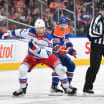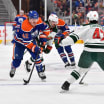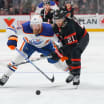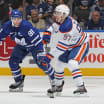The Oilers didn't practice on Wednesday after a pre-planned CBA-mandated day off for the club but new head coach Ken Hitchcock did take the time to meet with the media to talk at length about his observations following his first game behind the bench and some plans he has in store for the club.
Read a transcript of the conversation below.
TALKING POINTS: Hitchcock speaks at length with the media
New Oilers head coach Ken Hitchcock met with the media during a CBA-mandated off day for the club to talk more in depth about his plans for the team
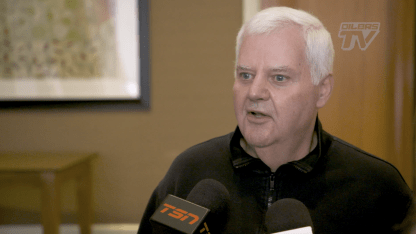
Q: What are your thoughts on how you deploy McDavid?
A: His recovery rate, cardio-wise, is astounding. He's able to get back up to speed quickly on the bench. That's something we have to take advantage of. But I think more than anything, he could come out every second shift if it's going to stay five-on-five the way it did last game.
My focus is going to be building his game from our end out. He needs to have the puck more, as do all of our centres because that's one of the strengths of the team. I think we need to find ways to get them the puck more deeper and that's going to be the focus.
Q: You mean deeper as in the defensive zone?
A: Understand the value of playing inside the dots and being in a support position where you're close to the puck everywhere. You're closer to the puck when the D have it, you're closer to the puck when the wingers have it. At that point, on your stick your touches are usually double. That's what we want to do is get way more touches for the centre ice position.
RAW | Ken Hitchcock
Q: Where do you stand on the idea of skilled guys that are expected to put up points cheating a little here and there for offence? Do they have to do it, is it acceptable in your system?
A: No (laughs). My view is when you have the puck, that's for you and when you don't have the puck, that's for us. I'm really flexible on with the puck stuff. I use concepts and ideas more than I use flat out Xs and Os but there's no negotiation when the other team has the puck. There's no negotiation at all and I expect everybody over the next couple weeks to start looking the same when the opposition has the puck. That's the area that's in my domain, that's the stuff that a coach controls.
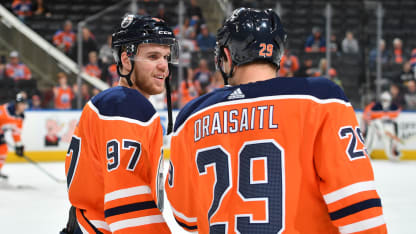
Q: With he and Leon Draisaitl as a tandem, there were stretches where they played together, there were long stretches where they've been apart. You clearly have two potent offensive weapons. Where do you stand on the quality of hockey you can play with them together versus apart?
A: I think they work really well together. They find the ice for each other. Leon's soft touches with the puck really surprised me. I knew he was a good player. I didn't know he had touches with the puck like he does. Right now, I'm really focused on keeping him together unless there's an injury that forces us otherwise.
The thing that goes underrated is I'm able to do that because of the good play of Nugent-Hopkins. I'm able to play those guys together because Nugent-Hopkins he can carry a line and he's capable of doing that stuff. He's a very effective player.
Q: When you had Mike Modano, you had to teach him to play the way you want to play. I know it's a long time ago. Where are you on the theory that -- Bowman and Yzerman, Hitchcock and Modano -- Connor McDavid may score less but become a better all-around player?
A: I don't see the scoring less but to me it's about value system. I think even before Modano, it's Tyler Seguin. I think Tyler Seguin was a perfect example of a guy that needed to change and embraced it and had a great offensive year and even a better defensive year (in 2017-18 with Hitchcock as head coach).
I think that it's just changing your value system and understanding that speed is a weapon. If you use it without the puck, it becomes more effective. If you use it with the attitude that you can create pressure turnovers and mistakes, you're able to buy into that, you become a great player right away because you have an impact. You make the other team nervous. Not only when you have the puck but when they have the puck. That's what Seguin bought into and was very effective. Modano bought in and was very effective. The way Connor is, he's already two-thirds there already. Him and Draisaitl created about seven or eight turnovers yesterday that, if I was the opposition, I'd be scared to death because you make one bobble and they're gone.
If I can convince him that he can create unbelievable pressure even when the other team has the puck, he's going to be very effective.
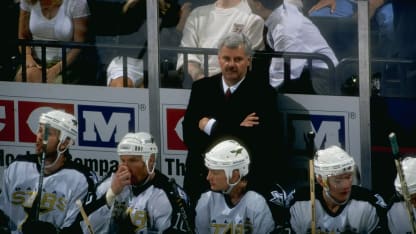
Q: If the 21-year-old player has changed over your tenure as coach, how has the 66-year-old coach changed in dealing with that 21-year-old player?
A: I think we've passed through Millennial and we're into the "I" Generation and I think the "I" Generation is fascinating because it's the most prepared generation I've ever seen in sport. Academically, too. Culturally, the same. It's my job to eliminate surprises. It's my job to make sure they know what I want, why, and what's in it for them. And I've got to explain that to them and I've got to be open in explaining that to them or else they're not going to buy in.
I think if you're willing to do that stuff and take the time to do that stuff, you make the adjustments that are necessary. If you go at it stubbornly and just say this is what I want you to do and they don't have any impact in the decision making and there isn't discussion, I don't think you get anywhere.
So you're prepared and it means you've got to open up. You've got to be comfortable opening up as a coach. You've got to be comfortable with the dialogue. I know there's been plenty of times over the past few years that we've gotten into discussions and the player hasn't agreed with me and we negotiated a change. We've met halfway. I think that's what coaching in this day and age is. You've got to meet them halfway and to start with you've probably got to go the most distance at the start of the conversations.
Q: When you dig in and watch last night's game again, what did you learn that you didn't know?
A: This team's built different than even I thought. I think this team is really interesting. The third period to me was really interesting because they have some qualities that are really exciting, for me anyways because there was every reason to not play yesterday. Third game in four nights, you're down, you're chasing the game the whole game. And then when you should be tired, you go the exact opposite direction. We were really energized and we were grinding.
I found that the weight and the size and diligence of this team was really impressive. It's my job to get it out of them more and more as we move along. But we can play quick. We're not the fasting team in the National Hockey League but we can play quick and their ability to buy into basically being able to do that with no practice, just a bunch of board discussion and then in between periods the same type of discussion. That's the part where I was really coaching hard was between periods. And they flipped the switch and that to me makes you feel really good as a coach.
Q: You mention the centres having the puck more, especially down low in your own zone to get it out. Is that the ticket to making this team a little bit quicker?
A: We're too spread out. We're not close enough to the puck as a group of five and we've got to get a lot closer to the puck. Our quickness has to be in 10-foot puck support and we're having to make long plays. Not only on exits but on counters. We're having to make too many long plays. We have to get back to being prepared.
The buzz word in the NHL is 'fast' and I think it's false. I think it's an improper word. I think fast is not the way you want to play because it becomes impatient. When you try to play fast, you take yourself out of position too quickly. I think you want to play quick. When you look at the top teams, man they play quick. And they play quick because they find pockets to create space to play quick in and that's what I want to get to. We want to create space to play in.
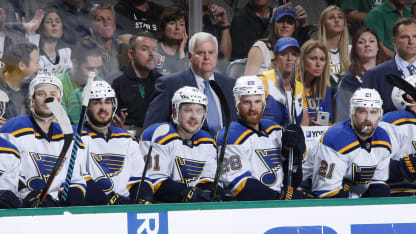
Q: You've moved forward in all these philosophies and changed your ways a little but then you put together a line like Kassian, Lucic and Brodziak which could have played for the Bruins in '86.
A: Identity line. I believe that you have to have a group of players that set the work standard on your hockey club. If you're asking your top players to do everything then you're not putting players who should play that way into the position to have success.
I want them to set the tone and the dial for the way we want to play. They're maybe not going to score as many goals as they did when they were younger and who knows but when you see the way they play some shifts yesterday, they set the table for other people perform. And that's what I want a line like that to do. I don't know who I'm going to put on it but who's ever playing with Brodziak has to play that way. They've got to set the table. They've got to grind that team down to where all they're doing is chipping and changing and now we've got them on the three-quarter ice game and now we're burying it.
They had some good shifts to set the dial. We've got some work to do with it but if they continue to improve and set a dial like that, that's going to open up space for everybody else.
Q: For Milan with all this talk of him not scoring in so many games now, does this mean he doesn't have to worry about that?
A: There's a reason he doesn't score. He goes to a support position on the ice too quick. He doesn't hold ice. If he holds ice longer, he's going to get a ton of chances. He's going to get them going off shin pads, skates, legs, everywhere but he doesn't hold ice long enough. If I can get him to hold ice longer in critical scoring areas, he's going to be way, way more effective. It's the same thing if Kassian can do the same thing on the other side. They don't hold ice enough. They're gone to support positions way too quickly. We end up on the outside all the time, with the puck, but we're not on the inside. It's really simple small adjustments. We'll get them to do it in practice tomorrow (Thursday). I think that group, some of those guys, that's the group that's going to change the quickest because this is easy to make these changes and adapt to it.
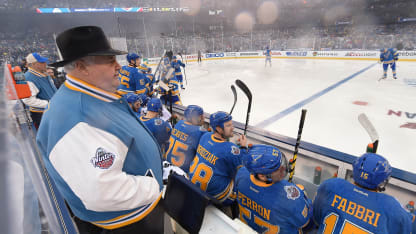
© Brian Babineau/Getty Images
Q: You said yesterday that St. Louis took eight or nine days before starting to see results. Do you have a sense based on one game, just your overall feeling of personnel what the time line might be?
A: Well, I don't know. I thought you needed five, six, seven practices to get going and I saw the third period and... I can't answer that now. I didn't expect what I saw in the third period to happen. That's a real positive. I thought as the game was going on, this is nice, we're giving it a real go and what's going to happen. We went a whole other way. I don't think we were a lot of fun for San Jose to play against last night. We weren't a lot of fun in the third period so we'll see.
Q: What about the crest? You've been around Edmonton forever. You've never coached the team, you've never worked for the team. You've coached a lot of teams but is there still something there for you?
A: Yes. Look, I got 550 texts in the last 24 hours and 40 from former Midget players. They all live and work in the community. They're season ticket holders. I feel a sense of responsibility that goes way deeper. When you're getting 150 calls from families and people that you've pushed. People that I've sold sporting goods to have become my best friends. That's pretty deep. I feel that and I'm excited by that. I'm not afraid of it, Spec. But I know the responsibility that sits in front of me because there's people I've lived my whole live with that I'm responsible. It's their team and I'm responsible for getting it to play as well as I can. I get that.


